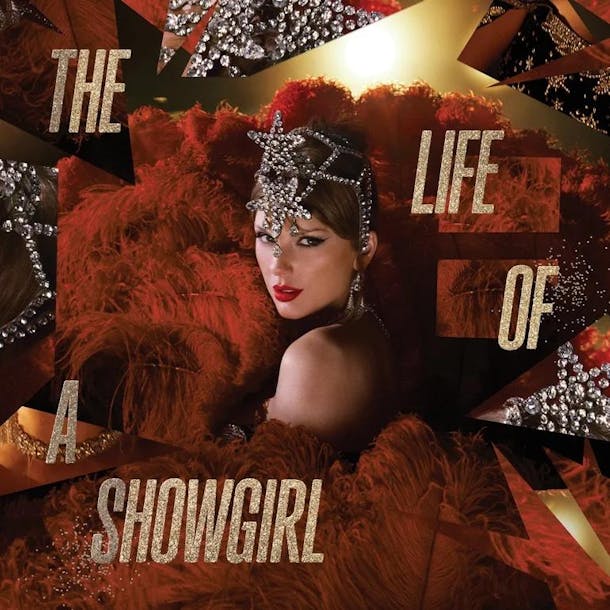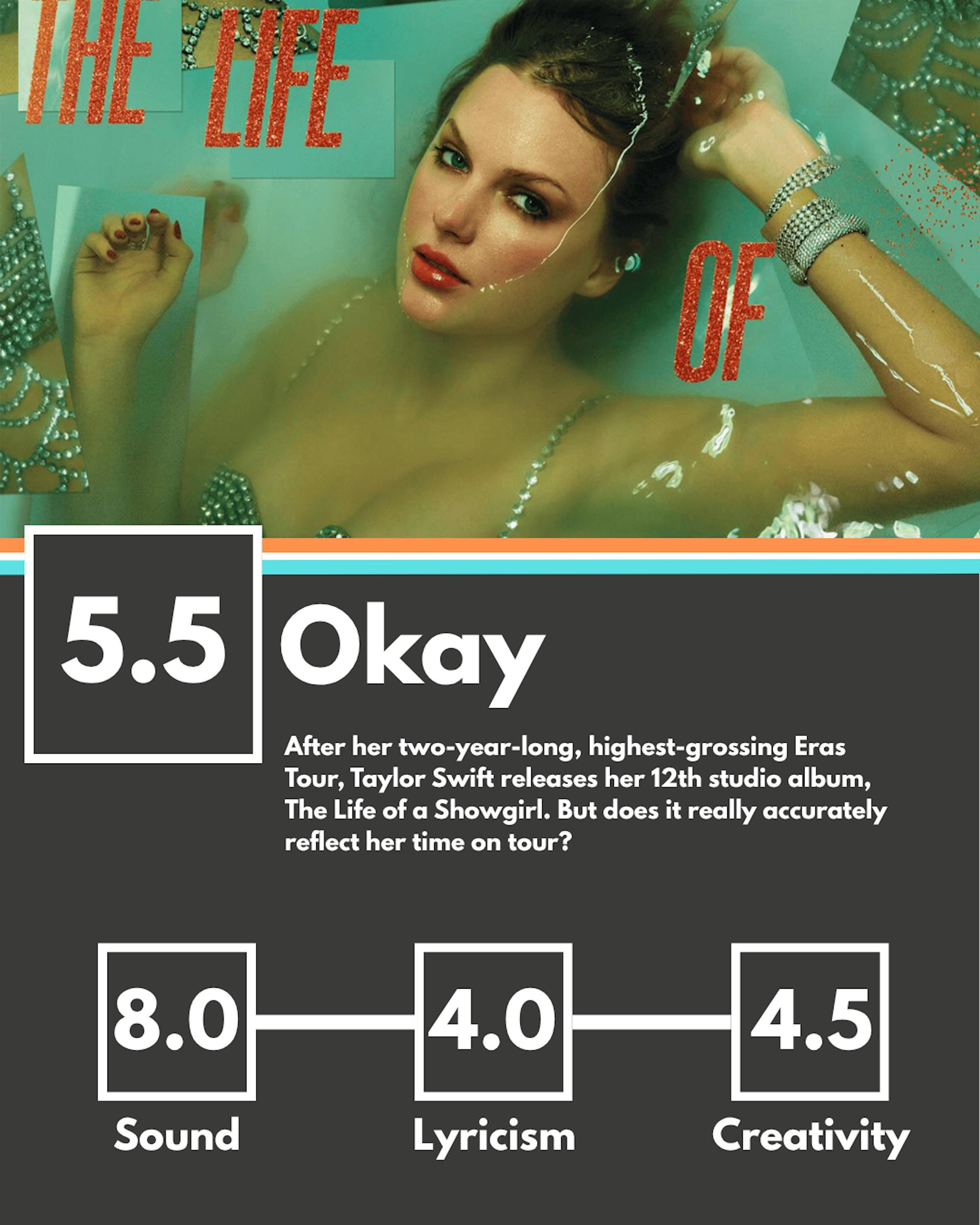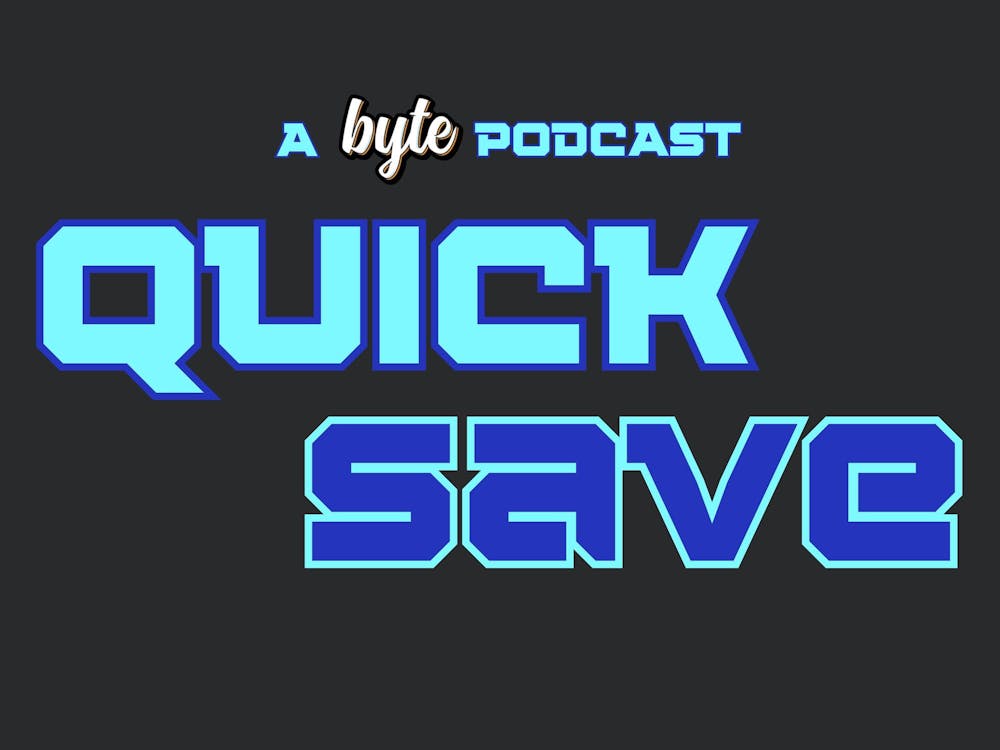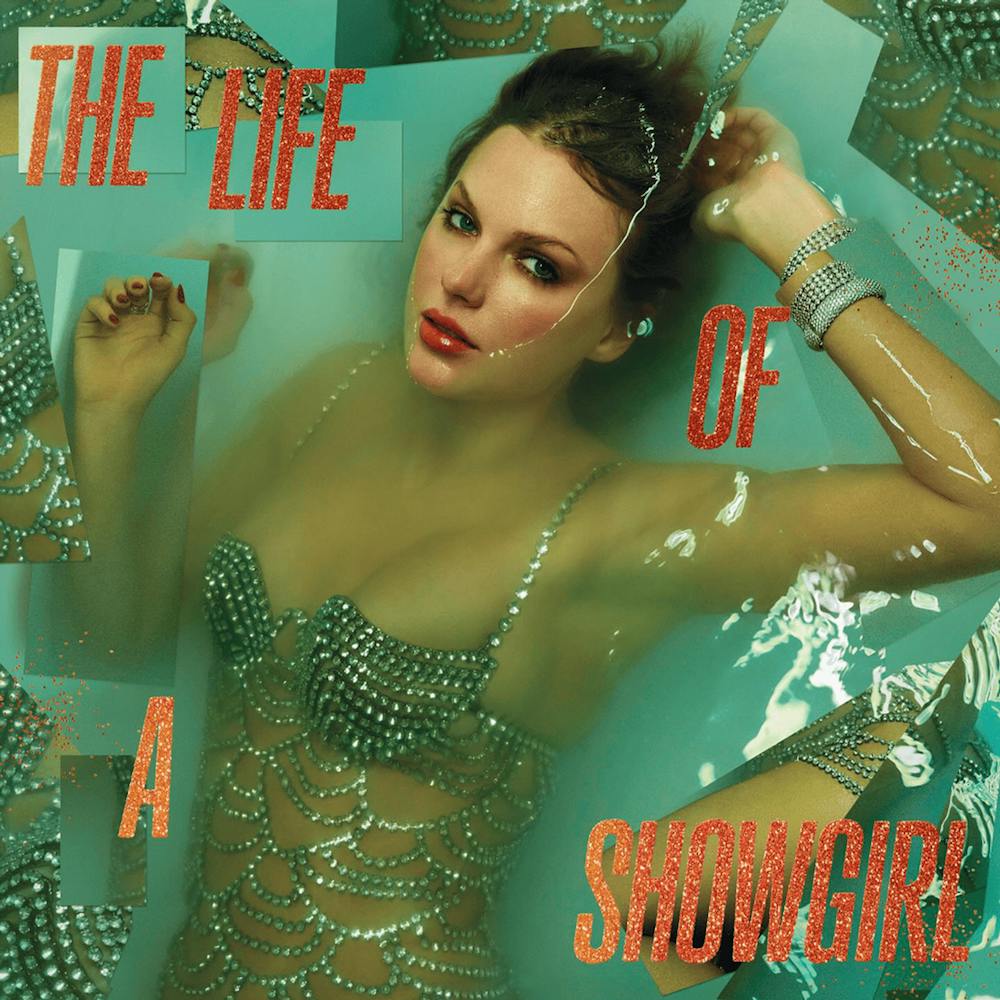The opinions and views expressed in this article are those of the author and do not reflect the opinion of Byte or Byte’s editorial board.
After touring for two years, releasing her 11th album on said tour, and a few more Grammys, Taylor Swift released her 12th studio album The Life of a Showgirl. Swift revealed on the New Heights podcast that she had been working on the album since mid-2024 after visiting Sweden on The Eras Tour, and reuniting with long-time producer Max Martin and Shellback. After working heavily with Jack Antonoff and Aaron Dessner for the past five albums, fans were excited to hear a new sound from Swift, but it seems she missed her mark with this release.
It’s Hard to Defend the Writing
Swift is primarily known for her songwriting. Since her debut in 2006, her storytelling through lyrics has been heavily praised. The way she expresses her emotions descriptively and creatively has always captivated me. However, this album lacked that writing immensely. Swift’s past projects—like folklore and evermore—have definitely created this expectation of deep and thoughtful writing that is unsustainable for any artist. As a fan who grew up dramatically singing “You Belong With Me” and “Shake It Off” in the back of the car on the way to school, I don’t need deep writing to enjoy the meaning, but The Life of a Showgirl lacks in ways that seem a bit shocking.

Songs like “Eldest Daughter” and “CANCELLED!” are another angle of themes Swift has been writing about throughout her entire career, but these tracks have such basic metaphors and are riddled with modern slang; it becomes so out of place within her discography. Swift has written about the media’s perception of her since Speak Now, and oftentimes they are very insightful as to how she handles being in the limelight, but these tracks lacked the nuance her older songs with similar qualities have. “CANCELLED!” was my most anticipated track on the album, hoping it would be a silly pop song similar to “Blank Space” or “Shake it Off” on 1989, but it was far from that. The lyrics are so dramatic and unserious that I can’t help but roll my eyes anytime I hear it. I wish Swift took some of that playfulness on “Actually Romantic” and used it on this track; it needs some serious lightheartedness to it.
Every song has at least one line with strong imagery, reinforcing the fact that Swift is a strong songwriter, but she fell short when it came to writing the full song. The verses of “Father Figure” flex that writing muscle I know Swift has, but when it comes to the chorus, it falters heavily. This seems to be the case with most songs on the album and if she had spent a little while longer enhancing the lyrics rather than pushing to make an album so soon after her last release, this would be a very different article. But unfortunately, the writing did not live up to the standard Swift is held to.
Aesthetic vs. Intention
I love the aesthetic of the album. It’s clear that the showgirl theme was something Swift has held onto for a long time, waiting for the perfect time to use it. After finishing the highest-grossing tour of all time, now seems to be a perfect time to write about her life behind the scenes, but the execution proved otherwise. While her relationship with Travis Kelce started because of the tour, the only track to remotely mention her life on tour, or anything else besides her relationship with Kelce, is the title track “The Life of a Showgirl” featuring Sabrina Carpenter. When Swift heavily promoted the idea that this album is about the life of a showgirl, and not the show, I expected more about her life during that time. It was pretty disappointing to get an album that revisits the same themes The Tortured Poets Department covered more eloquently and interestingly. Swift needed to marinate in the showgirl aesthetic a little bit longer, and it would’ve worked better.
Swift seems to be the only artist to have all eyes on her during an album cycle. Being the biggest artist in the world tends to have that effect. However, one tactic that she does on her release cycle that causes a lot of first-week panic is her lack of pre-release singles. Since her disastrous release of “ME!” during the Lover era—which I personally still love and defend—Swift has opted to wait until the album's release to push a single. This is a problem. Swift creates “eras” for each album, and announcing an album with a specific aesthetic will cause predictions of what the music will sound like. Once these assumptions are made, listeners will be disappointed when the album is released and sounds nothing like what was expected by the minimal promotion beforehand. This is why folklore did so well. When the album is a surprise, there’s nothing to expect. Releasing “The Fate of Ophelia” as the first single in early September would have eased listeners into the rest of the album. So much negative attention would disappear if Swift went back to pre-release promotion.

The Bright Side
Although the more serious songs on the album were a miss for me, Swift knows exactly how to make a bright and bubbly pop song. “Opalite” and “Wood” are some of her best-produced pop songs since 1989. The simple but descriptive songwriting on “Opalite” is exactly the treatment the rest of the album should have gotten. Despite the overwhelming number of people who dislike “Wood,” I personally find it so fun. The production is so fun and lighthearted, very fitting for the silly, sexy writing. The actual sound effect of knocking on wood when Swift sings “I ain't gotta knock on wood” is so clever and has been stuck in my head since its release. Swift needs to flex her humor in writing more often.
The production is also pretty solid. I’m a part of the small minority that absolutely loved The Tortured Poets Department, and actually really enjoy Antonoff’s synth-y production style, but this was a breath of fresh air. Hearing drums, guitars, and brass instruments littered throughout the album was a pleasant surprise. I unapologetically love mainstream pop music, making the sound of the album so entertaining to me. It’s just unfortunate that the writing didn’t match the production.
My Wish List for the Future
I actually didn’t completely hate The Life of a Showgirl, it’s just disappointing to see Swift promote an album with full force for the first time in years, just for the product to end up being an inaccurate representation of Swift’s creative talents.
“Ruin The Friendship” highlights that storytelling aspect that Swift desperately needed within this album, and I hope to see her return to it on her next projects. There were so many aspects of The Eras Tour and Swift's life between the shows that I would have loved to hear about on this record, but ultimately it became a record reiterating the same themes of love and fame that we’ve heard from her since her early years as an artist. With Swift’s next project being her 13th album, there’s a lot of pressure to get it “right.” Hopefully the songwriting she’s been praised for her entire career finds its way back on there.

Sources: Spotify, Spotify, Spotify, TSTheErasTour, SpotifyforArtists, XFormerlyKnownAsTwitter, Spotify, Spotify, Spotify, Spotify, Spotify, Spotify, Spotify, Spotify, Spotify, Spotify, Spotify, Spotify, Spotify, ESPN, Spotify, Spotify, Spotify, Spotify, Spotify, Spotify, Spotify, Spotify, Spotify
Contact Sam Jasionowski with comments at samantha.jasionowski@bsu.edu or on Instagram @s.jasionowski.




















